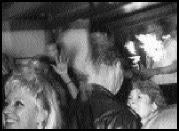“ASS BACKWARDS.”
That’s attorney William Broberg’s blunt assessment of the city’s special-events review process, now undergoing its second challenge in federal court. Last week, Broberg and his clients, activists Jim Goettler and Bob Barnes—organizers of the annual Nov. 30 (N30) demonstrations commemorating 1999’s protests against the World Trade Organization—amended their complaint about the way Seattle approves or denies special events like demonstrations, festivals, and holiday carousels. Broberg hopes to upend Seattle’s entire special-events review process, an action he believes would have implications across the country.
Broberg’s lawsuit alleges that the city’s special-events law was used to “harass, threaten, intimidate plaintiffs for, and discourage plaintiffs from, engaging in constitutionally protected speech, assembly, and expression.” The lawsuit also says that the city applied the ordinance arbitrarily against the activists “due to the content and the viewpoint” of their demonstration.
The challenge stems from the activists’ attempts last year to get a permit to hold their global-justice rally in Westlake Park downtown. The problem: The Downtown Seattle Association [DSA], which represents downtown businesses, planned to take over the park for nine weeks to run its annual holiday carousel, starting Nov. 5. When Goettler asked the city for a permit application back in July, he was told that the DSA had already received its permit—”a flat-out lie,” Broberg says. When Goettler finally filed an application in early November, it got turned down because the city said the park couldn’t accommodate both events. By following the DSA’s paper trail back to July, Goettler and Barnes discovered that the city hadn’t actually issued a permit for the carousel until a full week after they talked to Goettler—a violation, the organizers believe, of the city’s own permitting process. By turning down their application, the N30 protesters argued, the city was also giving too much discretion to city officials. Last November, U.S. District Judge Marsha Pechman agreed and granted the activists an emergency permit to demonstrate at the opposite end of Westlake Park from the carousel. Ironically, after last year’s tortuous process, last week Goettler and Barnes almost instantly received a permit to hold an N30 demonstration in 2002. “Nobody asked any questions; they just issued it,” Broberg says.
Case closed? Hardly. Goettler and Barnes say the constitutional issues they raised in their original lawsuit haven’t gone away—if anything, they’ve become even more pressing. The main problem, they say, is that the special-events law allows city officials far too much discretion in deciding which events get submitted to a rigorous review and “grilling” before the special-events committee—a 15-member city-appointed tribunal—and which get rubber-stamped. “The wording of the ordinance isn’t that onerous—it’s how it’s applied,” Barnes says. “We feel it places an undue burden on our right to free assembly to have to seek permission from a government agency to exercise our First Amendment rights.”
Gary Keese, the assistant city attorney who is handling the city’s defense in the case, says the decision on which events will go through the more rigorous review process is based on a number of factors, including the size of the event, the impact it will have on the neighborhood, and how long the event has been around. “The special-events committee takes the whole application process very seriously,” Keese says.
But the N30 activists say they shouldn’t have to prove their right to hold a constitutionally protected demonstration. “The law requires anyone who wants to regulate political speech to show the reason” for doing so, Broberg says. “Our city wants anyone who wants to practice political speech to prove their right to it. This is about access to a public forum that we all should have equal access to.”
Why Westlake? The N30 organizers say the park is the only large public space in the middle of the downtown shopping district, making it an ideal location for the group to broadcast their anti-corporate message. And it was a major focus of 1999’s anti-WTO protests. The juxtaposition of anti-capitalist demonstrators marching on Westlake while a carousel supported by downtown business interests whirls in the background is also undoubtedly appealing to organizers—and a headache for the city. Last time around, the city attempted to get organizers to move the demonstration elsewhere—anywhere but Westlake, as then-Mayor Paul Schell memorably declared—or into the park’s less visible southern end (where it ultimately settled).
Broberg says that’s just evidence that the city wants to regulate demonstrations based not on their size or impact on public services—all fair game—but on their political content. “You can’t say, ‘I don’t like what you have to say, so I’m going to put you through a different process,” Broberg says. “These [challenges] seem aimed at this group’s particular message.”
The case, which won’t go to trial for at least another year and a half, could set a precedent for other cities with similar laws, requiring that they treat every applicant equally. Barnes hopes the lawsuit will do nothing less than “overturn the special-events ordinance” for good. More likely, Broberg says, Judge Pechman will agree that the ordinance has been applied unconstitutionally and require the special-events committee to treat every applicant the same. That would be plenty for Goettler. “It’s that incredible level of discretion that we’re trying to address with this case,” Goettler says.







